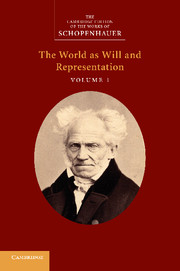Book contents
- Frontmatter
- Contents
- General editor's preface
- Editorial notes and references
- Introduction
- Notes on text and translation
- Chronology
- Bibliography
- THE WORLD AS WILL AND REPRESENTATION VOLUME 1
- Preface to the first edition
- Preface to the second edition
- Preface to the third edition
- First Book: The world as representation, first consideration. Representation subject to the principle of sufficient reason: the object of experience and science
- Second Book: The world as will, first consideration. The objectivation of the will
- Third Book: The world as representation, second consideration. Representation independent of the principle of sufficient reason: the Platonic Idea: the object of art
- Fourth Book: The world as will, second consideration. With the achievement of self-knowledge, affirmation and negation of the will to life
- Appendix: Critique of the Kantian Philosophy
- Variants in different editions
- Glossary of names
- Index
Fourth Book: The world as will, second consideration. With the achievement of self-knowledge, affirmation and negation of the will to life
Published online by Cambridge University Press: 06 December 2010
- Frontmatter
- Contents
- General editor's preface
- Editorial notes and references
- Introduction
- Notes on text and translation
- Chronology
- Bibliography
- THE WORLD AS WILL AND REPRESENTATION VOLUME 1
- Preface to the first edition
- Preface to the second edition
- Preface to the third edition
- First Book: The world as representation, first consideration. Representation subject to the principle of sufficient reason: the object of experience and science
- Second Book: The world as will, first consideration. The objectivation of the will
- Third Book: The world as representation, second consideration. Representation independent of the principle of sufficient reason: the Platonic Idea: the object of art
- Fourth Book: The world as will, second consideration. With the achievement of self-knowledge, affirmation and negation of the will to life
- Appendix: Critique of the Kantian Philosophy
- Variants in different editions
- Glossary of names
- Index
Summary
Tempore quo cognitio simul advenit, amor e medio supersurrexit
Oupnek'hat, studio Anquetil-Duperron, vol. II, p. 216[‘When knowledge asserted itself, thence arose desire.’ Oupnek'hat is a Latin version of the Upanishads (1801). The passage corresponds to Ātma Upanishad, 3, though as Deussen points out, no equivalent words are found there]
The final part of our discussion declares that it will be the most serious, since it deals with human actions, which are of direct concern to everyone; no one is unfamiliar with or indifferent to such a topic. In fact, it is so natural for people to relate everything to action that they will always consider that part of any systematic discussion which concerns deeds to be the culmination of the whole work, at least to the extent that it is of interest to them, and will accordingly pay serious attention to this part, if to no other. – In the present context, the discussion that follows is what is generally referred to as practical philosophy, in contrast to the theoretical philosophy that has so far been our concern. But in my opinion, philosophy is always theoretical, since what is essential to it is that it treats and investigates its subject-matter (whatever that may be) in a purely contemplative manner, describing without prescribing. On the other hand, for it to become practical, guide action, shape character – these are long-standing demands, and mature insight should encourage us to give them up once and for all.
- Type
- Chapter
- Information
- Schopenhauer: 'The World as Will and Representation' , pp. 297 - 440Publisher: Cambridge University PressPrint publication year: 2010

